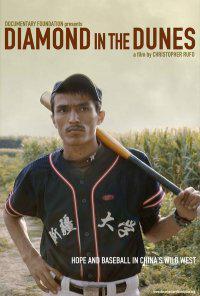 “But if a hero can arise — like Jackie Robinson — there will be great beauty in the world.”
“But if a hero can arise — like Jackie Robinson — there will be great beauty in the world.”
Diamond in the Dunes, a 2014 documentary produced by the Documentary Foundation, follows a baseball team in China’s Xinjiang Province, comprised of Muslim Uyghur and Han Chinese students. Racial tensions color the relationship between these two groups, as the indigenous Uyghur population had been conquered by Communist China in 1949. In retaliation, Uyghur Muslim terrorist groups have taken to violent attacks against their Chinese rulers.
The poverty of the region where Parhat Ablat, a 20-year-old Uyghur shepherd, lives comes to the forefront, from outmoded plumbing and appliances to the simple homes and scarcity of automobiles. The differences between the Chinese District and the Umghur District in the city of Urumqi are also apparent. The Chinese District booms with industry, towering businesses, lights, and automobile traffic. Umghur District, meanwhile, speaks to an older time, with more pedestrian traffic and street side markets. Even at Xinjiang University, the two ethnic groups are kept separate.
Baseball brings these two groups together, however, as each side finds itself unable to form a complete team without the other. Parhat forms and leads the team — the first-ever mixed race team at Xinjiang University. Without Parhat’s team, most of its players would never have even touched a baseball. During practices and scrimmages, everyone from the players on the field to the children in the stands bursts with the excitement of a four-year-old on Christmas morning. But as their practices also show, baseball is not an easy game to learn or play. It takes a lot of practice, and at times, it can be outright frustrating.
As the documentary depicts, there is more to any story than just what’s on the surface. Parhat isn’t just playing baseball, he is attending school and struggling over a love interest. The city of Urumqi deals with the strain and conflict that ethnic tensions provoke. As a result, the team has its share of struggles as well.
The team only plays one game in their season, against a Tibetan team on the Qinhai Plateau, a thousand miles away. Therefore, the documentary revolves around the players coming face-to-face with their ethnic differences and overcoming them as they learn to play as a team. When the time finally comes for the game, the train ride lasts thirty hours, and the game itself proves to be a struggle of its own for the Xinjiang players.
Parhat views baseball as more than just a game. To him, it is a means through which life lessons can be learned and one can grow emotionally, mentally, and spiritually. And, as he has proven in this documentary, it is also a means through which the hurts of our social world can find some healing.
My thanks to Steve for recommending this documentary. If you can spare about an hour’s worth of free time, I would like to pass on the recommendation: http://vimeo.com/76566259





